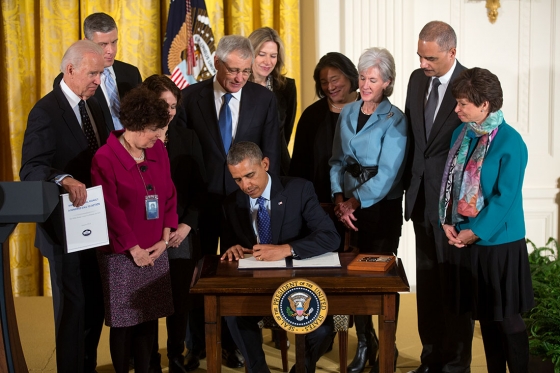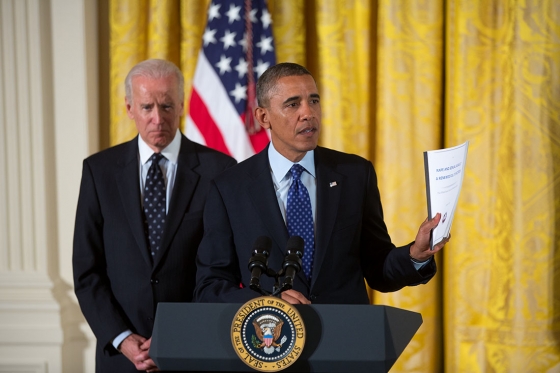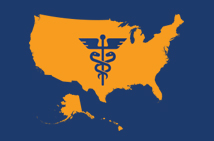A Renewed Call to Action to End Rape and Sexual Assault
As part of an unprecedented national effort to address alarming rates of sexual assault on college campuses, President Obama issued a Presidential Memorandum today to establish the “White House Task Force to Protect Students from Sexual Assault." The taskforce will be charged with sharing best practices, and increasing transparency, enforcement, public awareness, and interagency coordination to prevent violence and support survivors. The creation of this Task Force builds upon the President’s 2010 call to action, which urged the federal government to support survivors and aggressively take action against sexual assault.
The statistics around sexual assault in this country are nothing short of jarring. A report just released by the White House Council on Women and Girls entitled, “Rape and Sexual Assault: A Renewed Call to Action” reveals that nearly 1 in 5 women, and 1 in 71 men have experienced rape or attempted rape in their lifetimes. These statistics are stunning, but still can’t begin to capture the emotional and psychological scars that survivors often carry for life, or the courage needed to recover.
Today’s report states that students experience some of the highest rates of sexual assault. This violence, and the stress, fear, and mental health challenges that often follow, combine to increase dropout rates and limit opportunities for success in college for women and girls. The Administration is committed to investing in women’s education, training, and full inclusion in the workforce, and the President strongly believes that combatting sexual assault is vital to that effort.
It’s important that we keep the faces, and life-stories of our women and girls in mind as we continue this work. My office was recently connected with a young woman named Lauren who had personally experienced an attack, and who began to speak out last year in hopes that she may help more women deal with the pain, and complex layers of grief that afflict millions of women in this country every year.
Lauren was raped during her sophomore year in college, by someone she knew and trusted. This is the case more often than not. The trauma of her attack was debilitating on several levels, but as she put it, it was her inability to tell anyone was caused the most harm. She worried it was her fault. Had she drank too much? Did she lead him on? Did he not hear her say “no?” Was it no one’s fault at all, because he had been drinking too?
Lauren put on a brave face to make her way to classes, to work, and across campus, day in and day out, but her heart ache was profound. She felt unsafe, unclean, and consumed by unrelenting feelings of guilt, shame, and anger. For six months, Lauren bore that pain in her heart, and retreating from the world; crying through most nights, and skipping most meals. She couldn’t eat, she struggled to interact with her friends and loved ones, she felt perpetually on the verge of tears, and at times couldn’t find the strength to get out of bed for days at a time.
With time, and eventually, the aide of a psychiatrist, and friends and family who she felt comfortable sharing her story with, Lauren began to find her way back. Every survivor’s story, and the challenges they face is unique, but ‘unique’ in this case, unfortunately does not mean rare. Lauren’s story is the story of millions of women, and one that we must never forget. In the years since, she has used her voice and her writing to raise awareness and advocate for other survivors. She is doing everything in her power to make sure that women know that what happened to her is wrong and inexcusable. It is deserved by no one. And it is her right to tell her story without shame or fear. Lauren is not alone, and we should all join in her in making sure that no one facing this kind of pain ever feels that they are.
We all have roles to play in preventing experiences like these. Through better education and awareness training for our young women. Through the improved mentorship and socialization of our boys and young men. Through the empowerment of bystanders to recognize dangerous situations and to speak up.Through improved survivor support services, and more victim-centered incident intake and justice response policies on our campuses.
The White House Task Force to Protect Students from Sexual Assault builds on federal efforts already underway which seek to break devastating cycles of violence on campuses, and around the country. For example:
- In 2012, the federal government issued a revised definition of rape that includes rapes of men, and which better reflects the realities of sexual assault. This new definition will improve our understanding of where and how often this crime occurs.
- In 2011, the Department of Education and Vice President Joe Biden announced historic guidance to help schools understand their obligations to prevent and respond to campus sexual assault, as well as increase federal compliance and enforcement actions.
- President Obama signed a reauthorization of the Violence Against Women Act in March 2013. The revised legislation includes protections for LGBT, Native American, and immigrant victims that experience some of the highest rates of violence. VAWA also funds specialized training for law enforcement and prosecutors. In order to support survivors in the healthcare system, the legislation increases funding for specially trained sexual assault nurse examiners.
Both the President, and all of us on the Council on Women and Girls are committed to ending sexual assault and supporting survivors by improving school responses to violence, bettering criminal justice responses to survivors, and committing vital resources where it will do the most good. The Administration will also work empower both women and men to stand up against sexual assault, in order to change a culture of passivity and tolerance in this country, which too often allows this type of violence to persist.
We can and must change our nation’s attitudes toward these devastating crimes, and we all have a role to play in preventing violence, and supporting the millions of survivors across the country as they seek to rebuild their lives. The President has renewed his call to action to bring an end to sexual assault, and his entire team is eager to partner across government education, academia, and communities everywhere to ensure that our women and girls feel safe, secure, and in position to thrive when they head to school, and out into the world.








